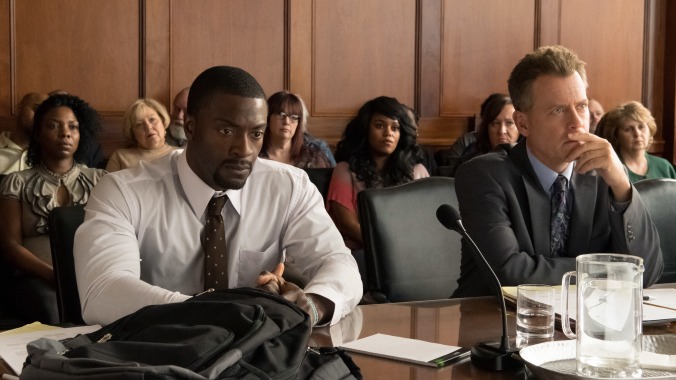Brian Banks knows that it’s an inspirational drama but isn’t quite sure why


“Freedom doesn’t just start on the football field,” intones Brian Banks (Aldis Hodge) at the outset of his semi-inspirational, semi-harrowing true story, correcting naïve audience members who had, until that moment, assumed that the American football field is the exclusive provenance of their liberty. It’s a brief bit of nonsense narration, but it fits Brian Banks perfectly. This is a movie that seems utterly convinced that it’s saying something profound, but proves difficult to actually parse.
Getting the real-life spoilers out of the way: Brian Banks is an actual NFL alumnus, at least technically; he played some offseason games for the Atlanta Falcons in 2013 before taking an NFL office job in 2014. His career as a player probably would have been lengthier if not for a decade-long absence from the game that began in 2002, when as a talented high school player he was convicted of raping a classmate. Pleading no-contest but privately insisting on his innocence, he served a five-year sentence, followed by years of probation.
The movie picks up with a new condition to Brian’s parole: California state law has required that he wear an ankle monitor at all times, limiting his proximity to schools and parks, because he is a registered sex offender. Frustrated by this new form of shackling and the limits it imposes on his already-shaky ability to gain employment as a convicted felon, he contacts Justin Brooks (Greg Kinnear), a lawyer and co-founder of The Innocence Project. After examining his case, Brooks believes Brian, based on the number of details that went unaddressed during the investigation and trial. Justin also emphasizes how difficult it is to overturn a conviction, and advises Brian to wait out his parole. But Brian is determined to prove his innocence.
Brian’s agency in this quest, not conducted while he’s behind bars, introduces some fresh elements to the legal drama, showing the far-reaching ramifications of injustice. Justin repeatedly mentions that he has other clients who are still serving their sentences and deserve priority over Brian—and that’s true, but the movie also makes the case that sentences can extend well beyond time served. Brian Banks also offers an intriguing legal puzzle regarding how to overturn a conviction off a no-contest plea, after most of the sentence has been completed. And it has a spiritual dimension in its flashbacks explaining how Brian was able to survive his stint behind bars.
Director Tom Shadyac has plenty of experience chronicling the criminal justice system and addressing issues of faith; after all, he directed Ace Ventura: Pet Detective, Liar Liar, and Bruce Almighty. It may seem like a cheap shot to point out his (enormously profitable) CV as a comedy director, but the procedural elements of Brian Banks don’t go much further than Shadyac’s Jim Carrey trilogy. Justin’s dialogue includes about a dozen variations on the phrase “the system is broken,” but identifying exactly how and why (beyond a vague complaint that no one “cares about the truth”) is outside of the movie’s purview. Justin is spurred to take on Brian’s case because everyone at the Innocence Project is fully and immediately outraged, ready to sacrifice even the most basic character traits to generically join the fight against that lousy system.
Brian, meanwhile, does his best to stay the course, as does the charismatic Hodge in flashbacks that fleetingly pair him with Shadyac’s erstwhile God, Morgan Freeman. The veteran actor isn’t technically reprising that role here, but as Brian’s prison teacher and mentor—a character so sketchily defined that it’s a surprise to learn he’s a real person—he’s very much indulging in Hollywood-ready Morgan Freeman Spirituality. He imparts some truisms, beatific streams of light shine, and Brian makes it through to fight another day. What is this guy actually teaching? What does he see in Brian? How does their relationship deepen into the mentor/mentee dynamic described in the obligatory where-are-they-now wrap-up? The movie doesn’t bother to say.
Brian Banks isn’t any more explicit about Brian finding himself at the intersection of a criminal justice system where Black men are treated unfairly and sexual assault too frequently goes unprosecuted. But at least it does some work to avoid turning into a fable of a man wronged by the false accusations of bad women; one supporting character is a woman whose sexual assault went unbelieved and unpunished. It’s a little schematic, but then, no one in the movie is allowed to show much personality.
They are allowed to give speeches, however. Although the movie doesn’t spend much time in a courtroom, the relocated speeches still come: stirring, tearful, and able to convince just about anyone of just about anything. The characters talk a lot about (and around) the system, God, and perseverance, but don’t say much about any of it, and at least one key breakthrough in Brian’s case seems to be the result of pure luck. The film is well-paced, but so narratively diffuse that a whole chapter in Banks’ life (his attempt to re-enter the NFL in his late 20s) gets shorthanded into an extended what-happened-next info reel. Just wait around a little more, Shadyac seems to be saying, and eventually you’ll get inspired.